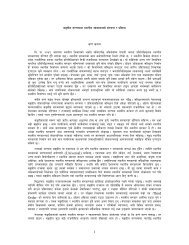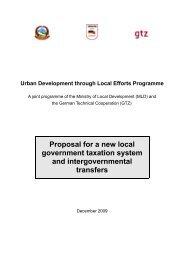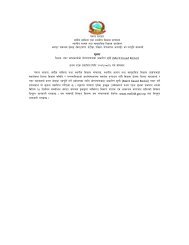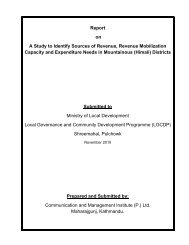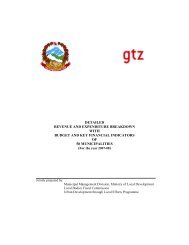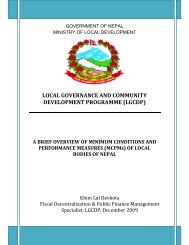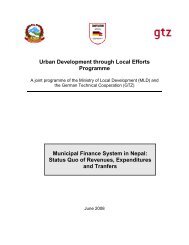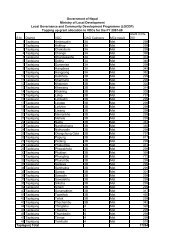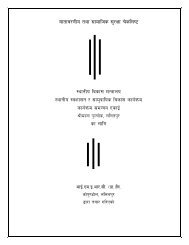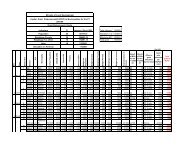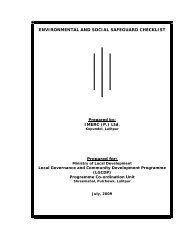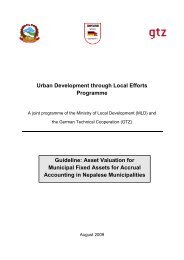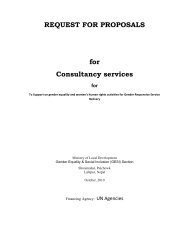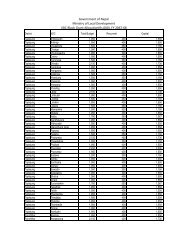GTZ Report on Accrual Accounting Status Quo - LGCDP
GTZ Report on Accrual Accounting Status Quo - LGCDP
GTZ Report on Accrual Accounting Status Quo - LGCDP
Create successful ePaper yourself
Turn your PDF publications into a flip-book with our unique Google optimized e-Paper software.
Findings and observati<strong>on</strong>s in the Nepalese municipalities 14<br />
03. Findings and observati<strong>on</strong>s in the Nepalese municipalities<br />
3.1. <strong>Accrual</strong> accounting history and past udle experiences<br />
• Since 1960/1961 municipalities are using the current government accounting system which was developed with<br />
the technical assistance of UNDP and USAID at that time 2 (see also World Bank, 2007, p.2; World Bank, 2003,<br />
p.46).<br />
• <strong>Accrual</strong> accounting activities in Nepal did not begin until the restorati<strong>on</strong> of democracy in 1990. However, efforts<br />
did not start until the Asian Development Bank (ADB) first made the implementati<strong>on</strong> of accrual accounting a<br />
c<strong>on</strong>diti<strong>on</strong> for Kathmandu Metropolitan City (KMC) for receiving loans. As a result KMC formed a taskforce for the<br />
implementati<strong>on</strong> of accrual accounting, developed a new chart of accounts and started further preparati<strong>on</strong>s for<br />
accrual accounting implementati<strong>on</strong>. These efforts were financed by the then existing Kathmandu Town<br />
Development Project.<br />
• Ever since the starting point of this discourse in Nepal, accrual accounting was usually referred to as “corporate<br />
accounting system or CAS”.<br />
• Beginning in 1992 the technical assistance to Nepalese municipalities in finance and management became <strong>on</strong>e of<br />
the areas of support, provided by the udle programme. Since then efforts focussed mainly <strong>on</strong> mobilizing municipal<br />
resources, improving municipal financial management, supporting computer skills training, computerizati<strong>on</strong>, DOS<br />
based cash accounting and tax software and the reforming of the accounting system (udle, 2006).<br />
• Starting in 1996 udle supported the introducti<strong>on</strong> of accrual accounting with a sensitizati<strong>on</strong> workshop at the UDTC<br />
in a joint effort with MuAN.<br />
• In August 1997 udle assisted in the preparati<strong>on</strong> of an accrual accounting manual which was supported in a joint<br />
effort with the Nepali Chartered Accountants.<br />
• In March 1998 another workshop, focussing <strong>on</strong> the merits of accrual accounting as well as the above menti<strong>on</strong>ed<br />
manual was c<strong>on</strong>ducted for municipal accountants.<br />
• In November 1998 a six days accrual accounting training at UDTC was c<strong>on</strong>ducted for the accounting staff of the<br />
municipalities of Kathmandu, Lalitpur, Bhaktapur, Butwal, Dharan, Hetauda, Pokhara, Siddharthenagar,<br />
Dhangadhi and Biratnagar. It was sp<strong>on</strong>sored by the Kathmandu Town Development Project. After that a computer<br />
accrual accounting training was c<strong>on</strong>ducted for the same municipal accountants.<br />
• In June 1999 Kathmandu itself organized a two weeks training in accrual accounting for its own accounting staff.<br />
• In October 1999 the MuAN presented an agenda stressing the implementati<strong>on</strong> of accrual accounting. On that<br />
meeting KMC also announced that it would implement accrual accounting in 2001. Therefore, accrual accounting<br />
was well established <strong>on</strong> the municipal reform agenda in Nepal around 1999.<br />
2<br />
This was reported by different municipalities during the research.



